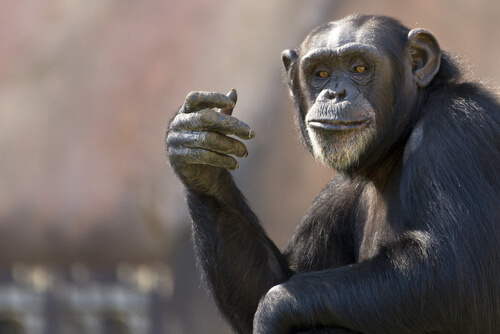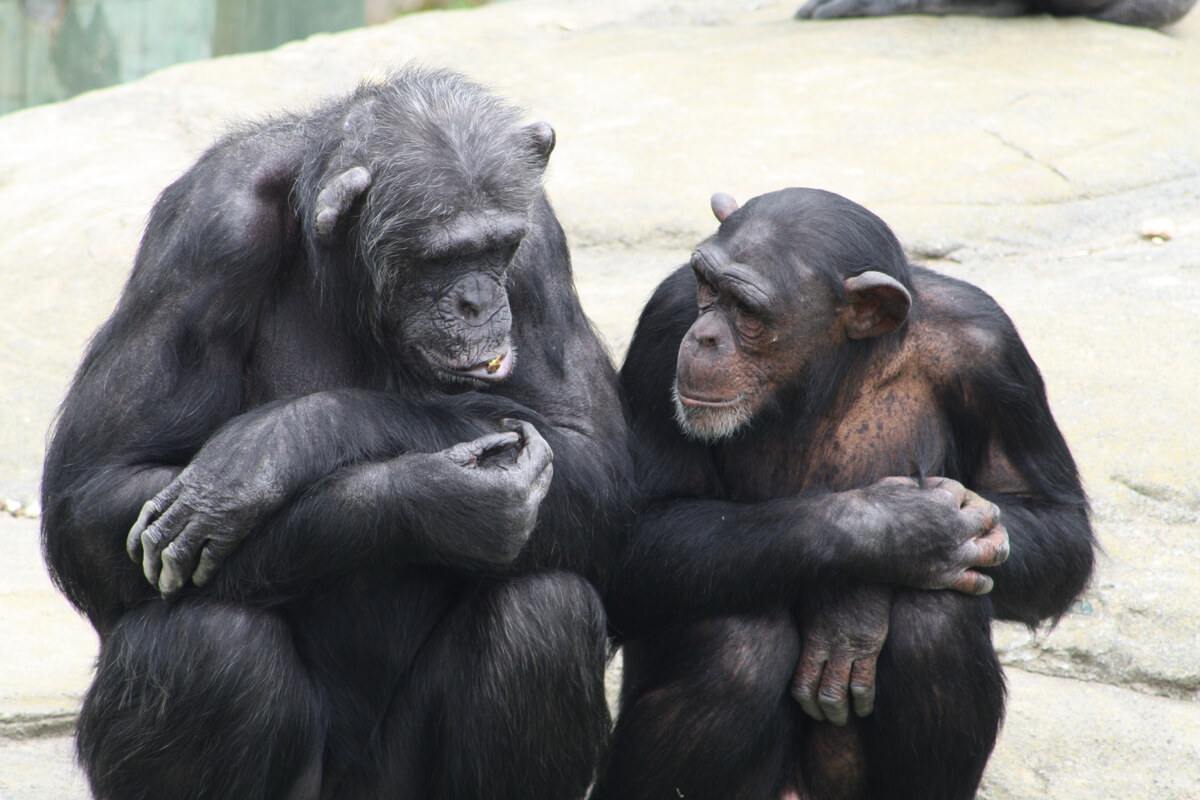Why Female Chimpanzees Avoid Humans

The enormous impact we humans have on wildlife has mobilized many animal groups to try to establish a sustainable way of life in harmony with the rest of the species. Recent research in this regard has found that female chimpanzees avoid humans when they populate areas inhabited by humans.
We humans are complex social beings, and when it comes to large primates, studying their behavior is essential in order to achieve a sustainable and peaceful coexistence. In this case, sex differences at a behavioral level have been noticed and we’re going to learn more about this research.
The complex behavior of chimpanzees

Chimpanzees (Pan troglodytes) are our closest living relatives in terms of DNA. We share 98% of the genetic material that defines us. This great similarity helps us to better understand their behavior, since, except for certain differences, it is guided by similar bases.
And understanding these hominids is as difficult as it is intuitive. They are probably the first to help us break with anthropocentrism and the belief in the superiority of our species. Empathy, intelligence and a culture maintained by an extraordinary memory are the 3 pillars that make chimpanzees a species worth knowing.
To say that they are social animals, diurnal, and living in fission-fusion societies is an understatement. Among the chimpanzees of tropical Africa, wars have been fought, territories are patrolled, deaths are mourned and friendships are formed between members of different groups. The more they are observed, the less sense it makes to separate ethology from psychology.
Chimpanzee-human cohabitation
Unfortunately, there is no chimpanzee-human cohabitation per se. Either humans move into the primates’ areas of the forest or the primates move closer to anthropogenic areas. Therefore, the survival of species such as the chimpanzee depends, unfortunately, on their ability to adapt to human encroachment and its effects.
This is precisely what the study cited at the beginning observes: how chimpanzees adapt to human presence compared to their natural spaces. This interest stems from the conflicts that abound in neighboring areas, in addition to the hunting of chimpanzees for human consumption, competition for resources and aggression resulting from chance encounters, among others.
That is, in the coexistence of two territorial species that often use aggression, as both of us are, an effective coexistence strategy is necessary. In this sense, it has been observed that female chimpanzees avoid humans compared to males. Let’s take a closer look at these results.
Female chimpanzees avoid humans, according to a study
This observational research was carried out in Uganda, in an area where the jackfruit tree (Artocarpus heterophyllus) is abundant. In this location, human encroachment into chimpanzee areas and the approach of chimpanzees to anthropogenic areas are common, as both species consume this fruit.
However, the study revealed an interesting detail, the groups varied in number in both scenarios. Further observation detected that female chimpanzees avoid humans, as they are the ones usually missing in expeditions to human territory. Moreover, this tendency was accentuated when some females were in the maternity period.
The configuration of the groups that went to risky areas was also different; males tended to lead the marches and to be on the periphery of the group.
Why do they avoid humans?

The study extrapolates its results to produce a specific hypothesis. The perception of risk posed by humans creates an impact on the social organization of chimpanzees. This has a number of implications:
- Differences between males and females in temperament and risk-taking are real and have an impact on chimpanzee society.
- This risk perceived by chimpanzees when entering anthropogenic areas, sustained over the long term, will create permanent changes in chimpanzee society.
- The absence of females in these areas is a pothole when it comes to transmitting the information necessary for survival, as young chimps won’t be there either to learn from them.
- The dominance of males within groups is accentuated in areas populated by humans.
Therefore, this conservative tendency of females when facing environmental risks has an adaptive value, but causes long-term consequences. It is very important to take into account that the influence of our species doesn’t only affect the ecosystem itself. Chimpanzees, as social and intelligent beings, adapt their lives and habits to avoid us. It is in our hands to minimize the impact we have on them.
All cited sources were thoroughly reviewed by our team to ensure their quality, reliability, currency, and validity. The bibliography of this article was considered reliable and of academic or scientific accuracy.
- Satsias, Z. M., Silk, M. J., Hockings, K. J., Cibot, M., Rohen, J., & McLennan, M. R. (2022). Sex-specific responses to anthropogenic risk shape wild chimpanzee social networks in a human-impacted landscape. Animal Behaviour, 186, 29-40.
- Gilby, I. C., Machanda, Z. P., O’Malley, R. C., Murray, C. M., Lonsdorf, E. V., Walker, K., … & Wrangham, R. W. (2017). Predation by female chimpanzees: toward an understanding of sex differences in meat acquisition in the last common ancestor of Pan and Homo. Journal of Human Evolution, 110, 82-94.
- McLennan, M. R., Howell, C. P., Bardi, M., & Heistermann, M. (2019). Are human-dominated landscapes stressful for wild chimpanzees (Pan troglodytes)?. Biological Conservation, 233, 73-82.
- Pan troglodytes (chimpanzee). (s. f.). Animal Diversity Web. https://animaldiversity.org/accounts/Pan_troglodytes/
This text is provided for informational purposes only and does not replace consultation with a professional. If in doubt, consult your specialist.